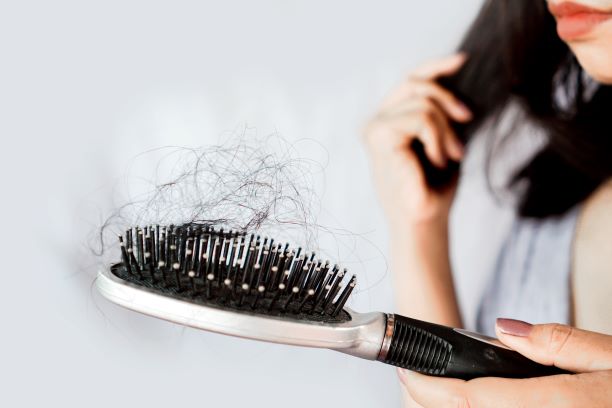
Excessive hair loss – When does too much hair fall out?
We lose hair every day. It falls out so that new hair can grow in its place. Probably all of us have ever wondered how much hair we lose every day. What is the number that should not cause us any concern and is considered normal, and at what number should we turn on the yellow warning light. When is excessive hair loss really a problem, when too much hair falls out? What are the causes and what is the simplest way to avoid hair loss? We will try to answer these questions.
What do we call normal hair loss and why does hair fall out?
We all lose hair every day. It falls out while we sleep and during our daily activities, often completely unnoticed. Hair loss is a natural and normal phenomenon. On a healthy human scalp, about 90-95% of the hair is in the growth phase, the remaining 10-5% is in the resting phase, so it is ready to fall out. Nature has equipped the hair follicles with an independent action to protect us from one-time excessive hair loss.
The natural life cycle of hair consists of three phases:
- growth phase
– lasts the longest – from 2 to 8 years
– usually affects about 90% of the hair on the head
2. transition phase
– lasts from two to four weeks, when the hair stops growing
3. resting phase
– lasts from two to four weeks,
– the hair becomes very weak and falls out
The further process is the resting of the hair follicle, which can take 3-4 months, after which the hair grows back. Over time, this process becomes less efficient. After the age of twenty-five, hair generally becomes weaker and grows more slowly.
The normal, natural and non-threatening norm is considered to be the loss of between 50 and about 100 hairs per day, and even up to 150.
Excessive hair loss – when does too much hair fall out?
It is extremely important to be aware of what our norm is. If you have lost between 50 and 100 hairs a day and this number has suddenly doubled, this could be a cause for concern. A person who has always lost more than 100 hairs a day should not be worried until this number starts to increase dramatically and the person starts to lose 200 hairs a day.
Experts make it clear that if a pillow is covered with hair upon waking up or a handful of hair remains in the bathtub after shampooing are signs of excessive hair loss. Visible thinning of the hair and the appearance of bald spots are also signs of excessive hair loss. If the hair loss occurs suddenly or is extremely severe, a consultation with a dermatologist is necessary.
Causes of excessive hair loss
It is normal for the hair and scalp to become weak during the autumn and winter months. This process usually lasts about five weeks and should not be a cause for concern: Hair becomes thin, brittle and fragile and falls out in large numbers to make room for new hair. In autumn and winter, it is worth helping hair – shorten it, intensively regenerate after the summer heat, sun exposure and sea bathing; help them rebuild from the inside by supplementing their diet with rich micro and macro elements.
External factors
- diet poor in zinc and iron, vitamin A, E, D, B5, biotin, omega-3 fatty acids
- inadequately balanced weight-loss diet
- Physical or emotional shock, which can cause sudden hair loss three to four months after the event
- low temperature, strong winds, frost, excessive sunlight, large fluctuations in humidity, acid rain
- smoking
- age
- use of antidepressants
- use of medicines for chronic diseases
- too frequent use of hot air dryers, curling irons and flat irons, hair extensions and hairpieces, teasing, braiding
- Frequent contact of hair with chlorinated or salty water
- improperly selected hair care irritating the scalp and weighing hair down
- use of aggressive chemicals during procedures such as bleaching or colouring
- treatments that change the structure of the hair such as chemical straightening.
Internal factors
- thyroid diseases
- Hasimoto’s
- the effect of male hormones, i.e. androgens, but of key importance is the effect of dihydrotestosterone, or DHT for short, a hormone that causes shrinkage of the hair follicle and thus prevents
- normal hair growth
- high concentrations of testosterone
- genetic predisposition
- Hormonal fluctuations in new mothers
- systemic lupus
- polycystic ovarian syndrome
- psoriasis of the scalp
- Seborrhoeic dermatitis.
- dandruff.
- atopic dermatitis
- anaemia
- diabetes
- alopecia areata
- borreliosis
- Addison’s disease
- trichotillomania
- neoplastic diseases
Excessive hair loss – how to avoid it?
What principles should be adopted to maintain healthy hair development? What methods can be used to help our body in its daily work? How to care for your hair so that it is beautiful, healthy, soft and shiny.
Here are some simple rules, which if followed will result in strong, resistant and shiny hair:
- a healthy, balanced, rich diet
- hydration of the body from within
- Minimisation of stress
- regular, circulation-stimulating massages of the scalp
- regular hair trimming
- the selection of appropriate care according to the structure, type and condition of the hair, which does not weigh down the hair
- limiting the use of hair styling products
- limiting the use of straightening and curling products
- use heat-protective products for hot styling
- handle your hair gently – do not pull or tug at it; wash and dry it properly
- don’t rinse your hair with hot water – it really doesn’t like it.

